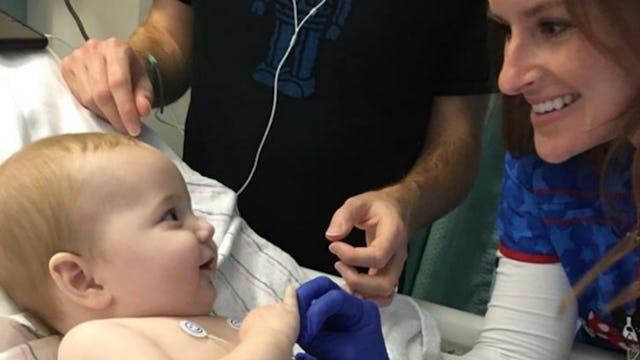Letter From A Food Allergy Mother

Dear Fellow Preschool Mother:
You probably didn’t notice me tonight, but I most definitely noticed you. You were likely unaware that I overheard you complaining to our children’s teacher about the peanut-free classroom. You cocked your head to the side in disbelief as you exclaimed, “Really? A peanut-free classroom?!” with a laugh. This concept seemed over-the-top to you and a real inconvenience.
But had you bothered to take a moment, you might have wondered if the mother of the child who was allergic to peanuts was, in fact, standing right in front of you. You might have wondered what things would be like if you had to walk in her shoes. So, please, let me tell you what it’s like to be the mother of a child with severe food allergies.
It is the nauseating feeling you get in the pit of your stomach every time you hear an ambulance drive past your office and you can’t help but wonder if they are rushing to your home a few blocks away to save your child. Could they have ingested something by mistake? Will the nanny call in a minute to confirm your worst fears? The terror lives in you 24/7.
Do you know what it feels like to cry yourself to sleep for two weeks as your 6-month-old son lies in the hospital? You were just trying to transition him to formula part-time so you could go back to work at six months postpartum, but he ended up having a severe allergic reaction to dairy. It didn’t occur to you to introduce the formula slowly like you would solid foods because what do babies eat if not breast milk or formula? By the time you realized something was wrong, he had already consumed all 8 ounces of formula, which is a lot of allergen for such a little stomach. The guilt is overwhelming.
Now you sit in the hospital for the 12th night in a row, and the team of gastroenterologists doesn’t understand why your baby’s albumin continues to drop and won’t stabilize despite the frequent albumin blood transfusions. Is it a small bowel injury, or something else? Do you know how terrifying it is to hear your doctors say the words “if we can’t stabilize his levels soon, we are going to have to transfer him to LA Children’s Hospital as we have run out of options.” To witness your screaming baby as four adults try to hold him down to insert the IV — again; the last time was equally traumatic. You feel his pain, and your heart breaks into a million tiny pieces.
To hold your breath day after day as they run more tests on your baby than you’ve had in your entire 33 years of life. To wait every day to see if the levels are holding or dropping, or by some miracle, rising. To hold your baby’s hand as he goes under general anesthesia so they can perform more tests — a colonoscopy, biopsy, and MRI. Then to once again hold your breath as you wait for pathology to report their findings and for blood result after blood result to trickle in to rule out every scary disease possible.
Then, by some miracle, his levels finally stabilize and begin to rise after two weeks. You finally see your baby no longer in so much pain from eating that they cry the entire time. You watch your baby’s swollen stomach start to decrease in size. You leave the hospital relieved, but exhausted.
Your 2-year-old daughter is confused and frightened because she can’t understand why her baby brother and parents have not all been at home the past two weeks. She, too, has cried herself to sleep most nights. You yourself expect to feel better now, for relief to sweep over you, but the trauma turns into PTSD on top of postpartum depression. Every time the baby cries when he eats from his bottle, you panic, thinking that your nightmare might just be starting up again.
You never want to feel that helpless again. So you continue to hold your breath. You hold your breath for months as you introduce each new food. You are afraid your child will get sick and you will misinterpret it as the beginning of another food allergy. You live in daily fear that he will accidentally consume dairy again. You are obsessive about every single ingredient label. You have to be — your child’s life is the on the line.
I know you could not have possibly known all of that when I was standing next to you, listening to you gripe about the inconvenience of a peanut-free classroom. But perhaps next time it would serve you well to consider what it must be like for allergy parents. I know there is a stigma attached. I know we are often seen as high-maintenance and a burden to other families. But please, take pause before you complain or mock us, and think about how you might feel if this was your child, your reality. I would hope you could empathize with us and understand that, like you, we only want to protect our children from danger.
This article was originally published on